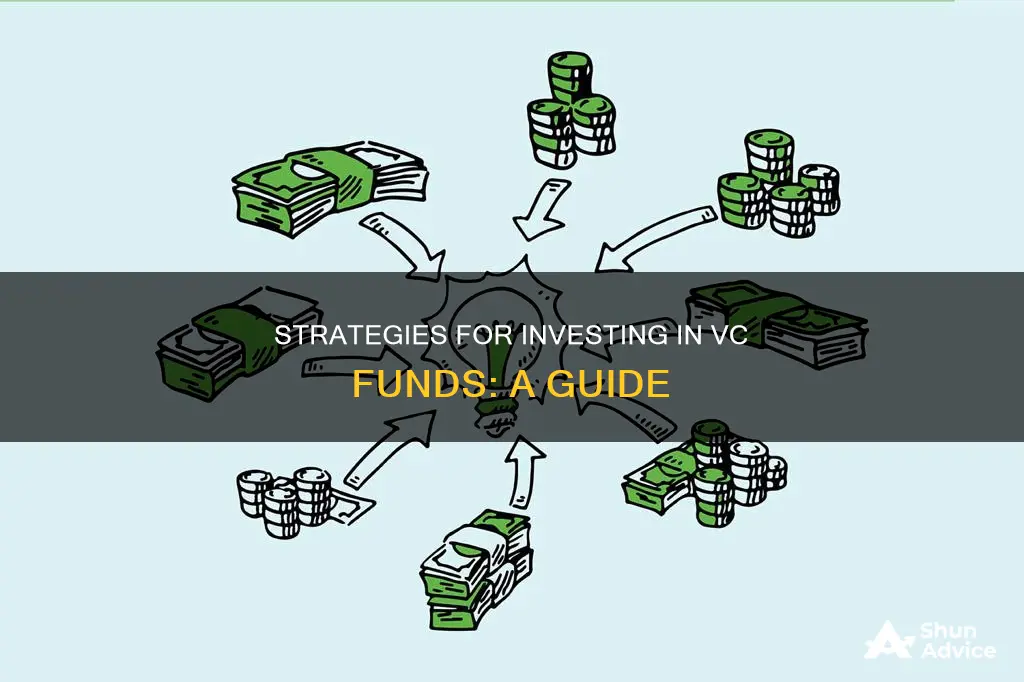
Investing in a VC fund is a risky but potentially rewarding endeavour. Venture capital funds provide start-up money to young businesses with long-term growth potential. Investors can make huge amounts of money quickly, but it's important to remember that most start-ups fail.
Historically, only accredited investors could invest in VC funds. However, since 2015, ordinary investors have been able to participate through equity crowdfunding. There are also other ways to invest in VC funds, such as investing in venture capital managers or through special-purpose vehicles.
Before investing in a VC fund, it's important to do your research and understand the risks involved.
| Characteristics | Values |
|---|---|
| Income | $200,000 per year, or $300,000 if married |
| Net worth | Exceeding $1 million |
| Investment style | High-risk, high-reward |
| Investment type | Startups and small businesses with long-term growth potential |
| Investment amount | $100 - $2,500 |
| Fund structure | Limited partnership or limited liability company (LLC) |
| Fundraising | From investors, crowdfunding, or personal networks |
| Management | Active or passive involvement in day-to-day investment decisions |
What You'll Learn

Understand the risks
Venture capital investment is a risky endeavour and should only be undertaken with money that investors can afford to lose. Investors must go into venture capital with their eyes open. There is a possibility of outsized gains and losses. Most startups fail, and investors may need to wait several years to receive their principal investment. In some cases, with failed startups, the investment return might be zero.
Historically, only accredited investors had the opportunity to invest in venture capital. An accredited investor must have a minimum annual income of $200,000, or $300,000 if married or in a joint income household, or a net worth exceeding $1 million. In 2015, the Jumpstart Our Business Startups Act opened the doors for ordinary investors to participate in equity crowdfunding, allowing several venture capital platforms for non-accredited investors to emerge.
There is limited liquidity when investing in venture capital. Investors may need to wait several years to exit their investments. The management teams of many early-stage companies are not as sophisticated as those of larger companies and may not be as high quality, therefore the chances of failure are higher.
Venture capital investment is a speculative investment and, in general, it is recommended that investors do not invest more than 5% of their investment dollars in speculative investments.
Vanguard Windsor II: Uncovering its Security Strategy
You may want to see also

Know if you're an accredited investor
To know if you are an accredited investor, you must meet certain requirements regarding income, net worth, asset size, governance status, or professional experience. These requirements vary depending on your jurisdiction. In the U.S., the Securities and Exchange Commission (SEC) defines an accredited investor as either an individual or a business that is allowed to invest in securities that are not registered with the SEC.
Income Requirements
To be an accredited investor as an individual, you must have an annual income exceeding $200,000 for the last two years, with the expectation of earning the same or a higher income in the current year. For joint income with a spouse or domestic partner, this threshold increases to $300,000 for the last two years, with a similar expectation for the current year.
Net Worth Requirements
In addition to income requirements, accredited investors should have a net worth exceeding $1 million, either individually or jointly with a spouse. This amount cannot include the value of a primary residence, meaning that any mortgage or loan on the primary residence is excluded from the net worth calculation.
Entity Requirements
If you are seeking accreditation as an entity, the requirements differ. An entity is considered an accredited investor if it is a private business development company or an organization with assets exceeding $5 million. Additionally, if an entity consists solely of equity owners who are accredited investors, the entity itself may qualify as an accredited investor. However, it is important to note that an organization cannot be formed with the sole purpose of purchasing specific securities.
Professional Experience
In some cases, individuals can qualify as accredited investors by demonstrating sufficient education or job experience in the financial industry. This includes individuals with certain professional certifications, designations, or credentials, as well as those who are considered "knowledgeable employees" of a private fund.
Verification Process
It is important to note that there is no formal process or government agency that confers accredited investor status. Instead, the companies issuing unregistered securities determine a potential investor's status by conducting due diligence prior to the sale. This may include requesting financial documentation, such as tax returns, W-2 forms, salary slips, or letters from financial professionals, as well as assessing an individual's credit report.
By meeting the financial and professional criteria outlined above, individuals and entities can determine if they qualify as accredited investors, providing them with access to unique investment opportunities that are not available to non-accredited investors.
Mutual Fund Investment: Answers to Your Questions
You may want to see also

Explore crowdfunding options
Crowdfunding is the practice of pooling small payments from the wider population to fund a specific goal. This has been a common way to raise money for centuries, but with the advent of the internet, it has become a popular method for funding creative projects, charitable causes, and product ideas.
There are four main types of crowdfunding:
- Reward Crowdfunding: This is the most common type, where members who fund a new company are offered incentives like free products or early access to services. Examples include Kickstarter and Indiegogo.
- Equity Crowdfunding: Here, investors provide funds in exchange for equity or ownership in the company. This type of crowdfunding is often used to raise money for startups and is usually facilitated by online platforms.
- Debt or Microlending Crowdfunding: This is a more complex form of crowdfunding that involves mini-bonds, peer-to-peer lending, and invoice financing.
- Donation-based Crowdfunding: This type of crowdfunding is similar to reward crowdfunding, but supporters do not receive any incentives or rewards. Examples include GoFundMe, where people raise money for personal causes or charitable initiatives.
Pros of Crowdfunding:
- Accessibility: It is relatively easy to get started with crowdfunding, as it does not require navigating traditional financial institutions like banks or venture capitalists.
- Feedback and Market Validation: Crowdfunding provides an opportunity to connect with potential customers, receive feedback, and validate the market demand for your product or service.
Cons of Crowdfunding:
- Unreliability: Crowdfunding does not guarantee funding, and while it may be ideal for initial funding, it may not provide the scalability that venture capitalists can offer.
- Limited Scalability: Crowdfunding campaigns are often one-time funding rounds, meaning there may be limited opportunities to raise additional funds once the initial goal is met.
Examples of Crowdfunding Platforms:
- MicroVentures: A crowdfunding startup platform that allows investors to back startups with investments as low as $100.
- SharesPost: A firm that typically offers private company investments for accredited investors, but also has opportunities for non-accredited investors with a minimum investment of $2,500.
- AngelList: Offers investment opportunities for both accredited and non-accredited investors, with the latter currently closed.
- SeedInvest: A crowdfunding company for accredited and non-accredited investors that was established after the passage of the 2012 JOBS Act. It has raised over $150 million for about 150 startups, with minimum investment amounts varying by the company.
Utility Index Funds: When to Invest for Maximum Returns
You may want to see also

Consider investing in venture capital managers
Venture capital can be a lucrative business, and the professionals have clear advantages over individual investors. Venture capital firms have large staffs with industry expertise and negotiating credibility, giving them a competitive edge.
Some investors prefer to invest in the companies that provide venture capital rather than investing directly in the start-ups that those venture capital sources fund. This is because some venture capital and private equity managers trade publicly, meaning you don't have to be an accredited investor or qualify for crowdfunding regulations to invest in them.
The downside to investing in venture capital managers is that you can't invest in just one start-up. Even if the manager profits from working with a key new company, those gains will be diluted by the many other investments that the manager has made. However, some see this diversification as an advantage, allowing them to benefit from the general health of the venture capital space without having to decide which start-ups will be most likely to succeed.
How to get started as a VC fund manager
If you're considering starting and raising your own venture capital fund, you might already work at a venture capital firm or be an angel investor. It's crucial to understand the ecosystem you're stepping into. Here are some steps to follow:
- Know your track record: Aspiring fund managers can establish a track record by making a series of angel investments, using special-purpose vehicles (SPVs) to give their network access to deals, or making warehoused investments while fundraising but before the fund entity is legally formed.
- Partner up: Starting a VC firm with someone who can complement your skills can be beneficial. For example, if you have a strong operational background, you might want to partner with someone with a finance or technical background.
- Determine your firm's structure: Most VC funds are structured as limited partnerships, composed of at least one general partner (GP) and at least one limited partner (LP). The VC firm is the business that oversees the investment strategies, while the VC fund is the legal entity that pools money to invest in assets and pursues its own investment strategy.
- Fundraise and form your fund: You'll need access to a pool of money to make investments. Typically, VCs raise a fund by soliciting contributions from outside investors, who become limited partners in the fund.
- Bring the resources back in: As the GP of the fund, the LLC you created has the legal authority to manage the fund's affairs, including hiring service providers.
- Operationalize your fund: Identify the right service providers to support and launch your fund, such as a bank, audit firm, tax provider, lawyer, and fund administrator.
Risks and considerations
Venture capital investment is risky and should only be undertaken with money that investors can afford to lose. Most start-ups fail, and there is limited liquidity when investing in venture capital. Investors may need to wait several years to receive their principal investment, and in some cases, the investment return could be zero.
Therefore, it's important to be smart and cautious when considering venture capital investments. Ensure you research the platform, individual small businesses, the company's owners, and understand the risks involved.
Emergency Fund Strategies: Philippines Investment Options
You may want to see also

Understand the difference between VC firms and VC funds
Understanding the difference between VC firms and VC funds is critical when considering how to invest in a VC fund.
A venture capital (VC) firm is a collection of legal entities formed to generate substantial returns for its investors by investing in high-risk companies that have yet to prove their business models' sustainability. VC firms are perpetual legal entities that raise and manage multiple individual VC funds over time. They are considered institutional investors, although not all VC firms are technically institutional investors. VC firms make investments from pooled resources, but they invest directly in companies, whereas institutional investors often act as intermediaries. Examples of institutional investors include investment banks, endowments, hedge funds, and insurance companies.
On the other hand, a VC fund is a separate legal entity created by a VC firm. It pools money from outside investors, known as limited partners (LPs), and channels it into investments in companies seeking capital. LPs can include family offices, fund-of-funds, insurance companies, public or corporate pension funds, sovereign wealth funds, university and non-profit endowments, and wealthy individuals. VC funds are typically structured as partnerships.
VC firms and VC funds differ in their structure, investment sources, and focus. VC firms have a perpetual existence, while VC funds are raised and closed over time. VC firms create and manage multiple VC funds during their operation. Additionally, VC firms raise capital from outside investors, which then gets invested into the VC funds. The VC funds, in turn, invest in companies seeking capital.
It is important to note that the terms used to describe the roles within VC firms may vary, and it is always a good idea to clarify roles and decision-making authority when interacting with individuals from VC firms.
Index Funds vs Roth IRA: Where Should You Invest?
You may want to see also
Frequently asked questions
Venture capital (VC) is an investment strategy in which investors provide early-stage private companies or startups with cash in exchange for an ownership piece of the companies. The hope is that the startups will become more valuable over time so that when there is a liquidity event or other opportunity to sell off equity in the company, the investors make a profitable return on their investment.
In the US, to invest in VC funds and other investments that don't file registration statements with the SEC to trade as public companies, an individual must qualify under SEC regulations as an accredited investor. That typically means that you need to meet at least one of the following conditions:
- Income of $200,000, or joint income with a spouse of $300,000, in each of the past two years.
- Net worth of more than $1 million, excluding the equity in your principal residence.
- Insider-type interest in the company in which you're investing, such as being an executive officer, director, or general partner.
Investing in VC is risky and should only be undertaken with money that investors can afford to lose. There is limited liquidity when investing in VC, and investors may need to wait several years to receive their principal investment. In some cases, with failed startups, the investment return might be zero.







